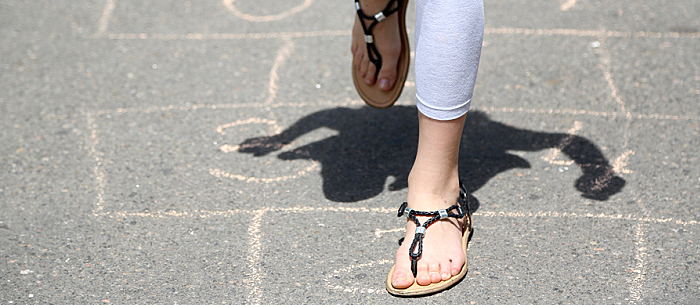
If you want your children to embrace learning, make learning more fun! Kids know sitting in a chair staring at flash cards doesn’t really fit the “fun” bill, but a game that combines a little learning with a lot of fun will get their attention. Educational games for kids make learning fun, so it’s easier to pay attention to the lesson.
For even more fun, invite other children to play along. According to Dr. Gail Gross, a nationally recognized psychologist, family-child behavioral specialist, author and educator, “Games are important because children, as social animals, will be culturalized — not only by the family but also through peer-group socialization. It also helps to develop a child’s psychomotor capacity and strengthen the muscles and bones.”
Check out these five active educational games for kids:
- Sylla-balls
Sonya Braun, an educational specialist for Kids ‘R’ Kids Learning Academies, recommends this game to help kids learn to “blend and segment syllables in spoken word.” It can be played indoors or outdoors, and you’ll need several balls. In a group setting, divide the children into groups of two or three. Say a word slowly and carefully. Children take turns bouncing balls to match the number of syllables. The game also works on eye-hand coordination and social-emotional goals as they play with an adult and peers. Keep score with tally marks. - Letter Sound/Sight Word Road
You’ll need colored paper, a black marker, and dice or a game spinner with numbers. To play, cut shapes approximately the size of a paper plate out of colored paper. Use whatever shape you’d like or a mix of shapes. On each shape, write a letter or sight word (depending on what skill you’re working on) with the black marker. You can choose uppercase or lowercase letters, or a mix of both. Arrange the shapes on the floor in a pattern, creating a path. Roll the dice or spin the spinner. Have your child move the number of spaces shown. Ask him what letter he landed on and what sound the letter makes, or have him tell you the word. - Letter Sound Hopscotch
Dr. Gross says outdoor games like this “require cognitive skill, planning and execution, which help a child mature and learn about healthy social interactions and relationships.” You’ll need chalk and a pebble or bean bag. Draw hopscotch squares on the sidewalk. In each box, write a letter. Have your child toss the pebble or bean bag into a box and hop on one foot to that box. Once she lands on the box, she must name the letter and say the sound. Then she picks up the pebble and hops back out. You can also do this using sight words or numbers instead of letters. - Sight Word/Letter Stomp
You’ll need paper cups or index cards — but it’s definitely more fun with cups! — and a marker.To play, write a sight word or letter on the bottom of each cup or index card. Arrange them around the room creating a path. Tell your child a word or letter and have him find it on the path. When he finds it, he gets to stomp on it! To add scoring, use a stopwatch to give kids 15 to 30 seconds to find the word or letter. - Numbers Bowling
You’ll need either six or 12 plastic bottles that are all the same size, water or sand, a marker and a softball.To play, number each bottle, either 1 through 6 or 1 through 12, with the marker. Fill each bottle a third to half full with either water or sand, so it’s weighted. Arrange the bottles in a triangle like bowling pins. Have your child roll the ball and see how many pins she can knock over. From here, you can do one of three things. Option 1 is to have your child name the numbers that she knocked over. Option 2 is to have your child count how many pins have fallen. Option 3 is to have your child add up the pins that have fallen.
According to Braun, “Educational games allow children a chance to stretch their dendrites, develop appropriate social-emotional responses and discover that life is not always fair. When it comes to educational games for children, oftentimes the learning is hidden in all the fun.”
Want more ideas to keep your kiddos active? Try these 8 Active Games for Kids.
Kathleen Marshall has homeschooled 5 children, often taking advantage of active learning days to keep her children busy and save her sanity.
Original Post – https://www.care.com/a/5-active-educational-games-for-kids-20150416144312


